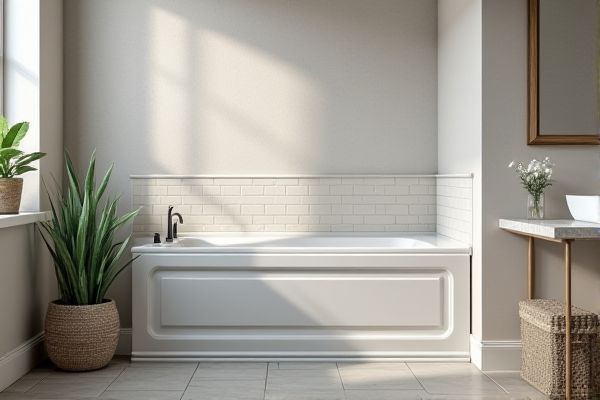
Alcove bathtubs are enclosed on three sides, making them ideal for water containment and space-saving in smaller bathrooms, while drop-in bathtubs require a pre-built deck or surround, offering a customizable and seamless look. Explore this article to discover which bathtub style best suits your bathroom design and personal preferences.
Table of Comparison
| Feature | Alcove Bathtub | Drop-in Bathtub |
|---|---|---|
| Installation | Installed in a three-wall enclosure | Installed into a custom-built frame or deck |
| Design | Fully enclosed on three sides | Exposed rim with customizable outer frame |
| Space Efficiency | Optimizes compact bathroom spaces | Requires more space for framing and deck |
| Cost | Generally more affordable | Usually higher due to framing and customization |
| Maintenance | Easy to clean with fewer crevices | Frame and deck require additional maintenance |
| Customization | Limited design options | High customization for deck material and style |
| Common Materials | Acrylic, fiberglass, porcelain-enameled steel | Acrylic, fiberglass, cast iron |
Introduction to Alcove and Drop-In Bathtubs
Alcove bathtubs fit snugly into a three-wall enclosure, optimizing space and providing a built-in look ideal for smaller bathrooms. Drop-in bathtubs require a custom-built deck or platform, allowing for a versatile design and seamless integration with surrounding surfaces. Understanding your bathroom layout and design preferences will help determine whether an alcove or drop-in tub best suits your needs.
Design and Structure Comparison
An alcove bathtub is designed to be installed within a three-wall enclosure, providing a space-saving and integrated look, while the drop-in bathtub requires a custom-built deck or platform for installation, offering more design flexibility and a tailored finish. Alcove tubs typically feature a built-in apron on the front, which streamlines cleaning and maintenance, whereas drop-in tubs have exposed edges that allow you to incorporate various materials and styles for a personalized aesthetic. Your choice depends on the desired bathroom layout and the balance between seamless integration and design customization.
Installation Process: Alcove vs Drop-In
An alcove bathtub requires installation within a three-walled enclosure, making it ideal for tight spaces and typically involving straightforward plumbing connections along one wall. A drop-in bathtub necessitates building a custom deck or surround to support the tub, which adds complexity and flexibility in design but demands precise measurements and carpentry skills. Your choice depends on bathroom layout and whether ease of installation or aesthetic customization is your priority.
Space Requirements and Bathroom Layout
Alcove bathtubs require three walls for installation, making them ideal for narrow, elongated bathrooms where space is limited, while drop-in bathtubs need a custom-built deck or platform, which demands more floor space and planning. Your bathroom layout and available square footage will determine the most efficient use of space, with alcove tubs fitting flush against walls and drop-in tubs offering design flexibility but requiring extra room. Choosing the appropriate bathtub type depends on balancing space constraints with layout preferences to maximize your bathroom's functionality and aesthetic appeal.
Cost Differences: Purchase and Installation
Alcove bathtubs typically cost between $250 and $1,500 for purchase, with installation expenses ranging from $300 to $900 due to their three-wall enclosure requiring less structural modification. Drop-in bathtubs have a broader price range from $400 to $3,000, with installation costs often higher at $800 to $1,500 because they require a custom-built deck or frame for proper fitting. The overall cost difference is influenced by the complexity of installation and the materials used in the drop-in tub's surrounding deck compared to the simpler alcove design.
Style and Aesthetic Versatility
Alcove bathtubs offer a classic, space-saving design that fits neatly into three-sided enclosures, making them ideal for traditional or minimalist bathroom styles. Drop-in bathtubs provide greater aesthetic versatility with customizable surrounds and finishes, allowing you to create a seamless, integrated look that matches your unique interior design. Your choice between these styles will impact the overall visual harmony and functional layout of your bathroom space.
Comfort and User Experience
Alcove bathtubs provide a snug, three-wall enclosure that enhances water heat retention and offers built-in support, promoting a cozy and secure bathing experience. Drop-in bathtubs are designed for customizable installation, allowing for various surround materials and designs that can elevate aesthetic appeal and comfort through added cushioning or ergonomic shaping. User preference often hinges on space constraints and desired immersion level, with alcove models favoring compact convenience and drop-in tubs allowing more luxurious, spa-like relaxation.
Durability and Maintenance Needs
Alcove bathtubs are typically crafted from durable materials like acrylic or fiberglass, offering easy maintenance due to their seamless installation against three walls, which minimizes mold and mildew buildup. Drop-in bathtubs, while visually appealing with customizable surrounds, often require more diligent cleaning of their exposed edges and surrounding materials to prevent water damage. Your choice depends on whether you prioritize the straightforward upkeep of alcove tubs or the design flexibility of drop-in models.
Pros and Cons of Alcove Bathtubs
Alcove bathtubs are space-efficient, fitting snugly into a three-wall enclosure which maximizes bathroom layout flexibility, especially in smaller spaces. Their built-in design simplifies installation and often includes integrated apron fronts for easy access and a clean aesthetic, but this configuration can limit design variety and may feel confined compared to open-sided tubs. Maintenance is straightforward due to the wall protection, yet cleaning can be challenging in narrow side gaps, and customization options such as varied shapes or freestanding styles are restricted.
Pros and Cons of Drop-In Bathtubs
Drop-in bathtubs offer a sleek, customizable design by fitting into a pre-built deck or surround, allowing for seamless integration with bathroom decor and easy access to plumbing. Their installation requires precise measurements and skilled labor, which can increase costs and complexity compared to standard alcove bathtubs. Maintenance can be more challenging due to the need to remove surrounding panels for repairs, but their aesthetic flexibility and design options make them a popular choice for modern bathroom renovations.
 homyna.com
homyna.com